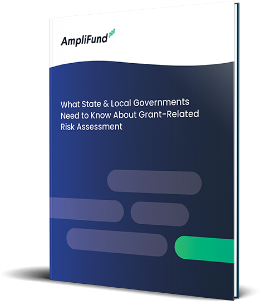Risk assessment isn’t just for grant makers. Grant seekers should be aware of the standards and practices they will be evaluated on when they apply for awards. Having knowledge of what funders look for in a risk assessment can help you be ahead of the game when it comes to shoring up your program’s performance.
The Uniform Grant Guidance (UGG) requires grant makers that award federal funding to conduct a pre-award risk assessment before awarding that funding (2 CFR 200.206(b)). The UGG lays out a few requirements for what a pre-award risk assessment should entail, but the guidance is notoriously flexible, and allows for a wide variation in what funders can, or do, evaluate.
Your organization’s previous award management practices, reporting history, and the processes and systems you have in place to manage funding are evaluated during this process, and the funder may or may not conduct a more detailed evaluation based on the capacity and needs of their own grants program. After the evaluation is complete, a risk level is assigned by the funder. Essentially, these assessments can be used as a way for funders to make an even more-informed decision about awarding.
Funders also use this assessment to determine if they should place specific conditions (Previously called “special conditions” in the Guidance) on a higher risk applicant who is still spearheading a project or initiative that they find value in. Overall, mitigating risk is part of the ongoing federal effort to avoid fraud, waste, or abuse of funds, and it is an essential practice for grant makers.
As a grant seeker, you can use information aimed at grant makers to gain a better understanding of these processes and use them to your advantage. For example, check out this advice for grant makers on pre-award risk assessment to see how you are being evaluated.
By having the information they are looking for on hand and ready to send to a funder at the appropriate times during the application and awarding process, you demonstrate your capacity for organization, your ability to compile the necessary information for reporting and compliance purposes, and your ability to properly manage the funding, even if you don’t have a long history of managing awards.
Check out our free step-by-step guide on writing an effective grant proposal.
*Photo by AndreyPopov from Canva.





